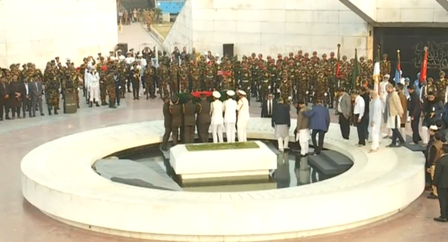
Dhaka, Sep 30 (IANS) Women in Bangladesh are becoming increasingly vulnerable in their economic contributions, overshadowed by rising radicalism, social insecurity, and institutional neglect, a report cited on Tuesday.
It added that the widespread lawlessness gripping Bangladesh following former Prime Minister Sheikh Hasina’s removal has had distinctly gendered consequences, threatening decades of progress amid political upheaval and disorder.
“By mid-2025, civil society organisations had recorded more than 200 cases of women vendors being threatened, assaulted, or forced to abandon market stalls. Many have retreated into unpaid domestic roles, reversing years of incremental progress. The story is similar in the informal urban economy,” a report in the Sri Lankan newspaper Daily Mirror detailed.
“Women street hawkers, domestic workers, and day labourers report higher risks of abuse, non-payment, and violence. Yet their stories rarely reach headlines, drowned out by the larger political crisis engulfing the country,” it added.
The report emphasised that microcredit schemes, many pioneered by Bangladesh’s Chief Advisor to the interim government, Muhammad Yunus, through Grameen Bank, once served as a vital bridge for rural women to engage in the economy. Yet, it said, under the Yunus-led interim government in 2024–25, these mechanisms have withered.
“Minority women face the harshest conditions. In 2025 alone, more than 49 Hindu teachers, many of them women, were forced to resign from schools after threats and attacks. Their displacement not only robs them of income but also deprives communities of female role models,” the report stressed.
According to the report, earlier in May, mob violence in Jessore district following the killing of a Hindu leader specifically targeted women’s homes, with looting and intimidation aimed to force them into exile.
“When minority women lose jobs, land, or businesses, their families often spiral deeper into poverty. Yet government statements continue to downplay the crisis, framing attacks as ‘political’ rather than communal, a narrative that erases the gendered dimensions of the violence,” it asserted.
The report highlighted that mob rule, illustrated by the 637 lynchings recorded in one year by rights groups, has created an atmosphere of constant insecurity, with women often the first victims of such breakdowns.
“In early 2025, a university student in Dhaka was harassed by supporters of a religious hardliner. When she sought justice, mobs surrounded the police station demanding her withdrawal of the complaint, issuing chilling threats of sexual violence. Instead of protection, she was pressured into silence. Incidents like these illustrate how the collapse of law and order silences women and discourages them from pursuing education and work — pillars of their economic independence,” it noted.
–IANS
scor/as




